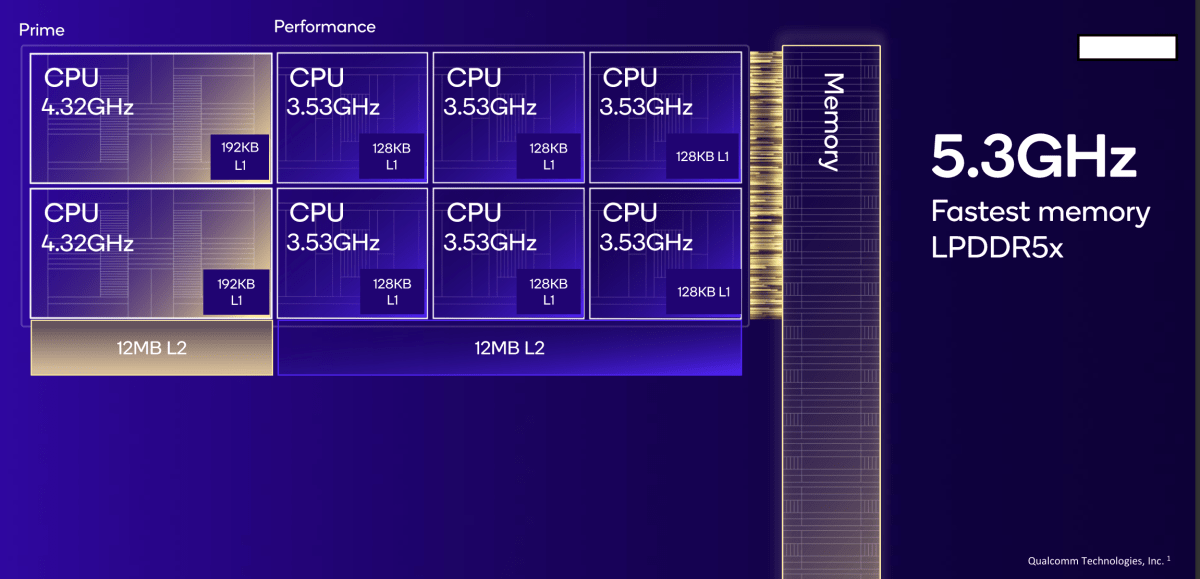Qualcomm’s new Snapdragon 8 Elite chip could tip a new PC CPU
Qualcomm just launched its new Oryon CPUs and the Snapdragon 8 Elite at the Snapdragon Summit in Maui. While these chips might be designed for phones and not PCs, the next-gen Oryon CPU core within those chips could be headed to PCs in a future iteration of the Snapdragon X Elite.
Referring to the new CPU as just a “second-generation Oryon CPU core,” Qualcomm isn’t giving it a definitive name — but the company is making a substantive change: adding “prime” cores while also tweaking the performance of its existing performance cores.
To be clear, Qualcomm hasn’t explicitly stated that the new Oryon cores are headed to PCs, or even that a PC version of these new Oryon cores would have the same configuration as the Snapdragon X Elite. The Snapdragon 8 Elite is headed to phones, with many of Qualcomm’s existing customers building smartphones around the new chip.
Qualcomm executives said that they “overhauled” the Oryon CPU, as well as the graphics core and the NPU, which is the foundation for the chip’s AI capabilities. All told, Qualcomm believes that the new Snapdragon 8 Elite consumes 44 percent less power while offering 45 percent more multi-core performance versus the previous Snapdragon 8 core. The chip uses a 3nm manufacturing process from TSMC.
What’s new in the Snapdragon 8 Elite?
Qualcomm
The key difference in the new Snapdragon 8 Elite is the addition of new, faster “prime” cores.
Qualcomm’s existing Snapdragon X Elite uses three clusters of four CPU cores, all running at 3.80GHz. The new second-generation Oryon CPU uses two prime cores, each running at 4.32GHz, with the remaining performance cores running at 3.53GHz. The two clusters — one for the prime cores, the other for the performance cores — all have 12MB of level-2 cache attached, helping the overall performance of the chip. Francisco “Cisco” Cheng, a senior director at Qualcomm, said that the chip does not have any efficiency cores within it, as they’ve been replaced over time by the energy-efficient performance cores.
Qualcomm said that it also improved the GPU, which rival Intel characterized as one of the strengths of its own energy-efficient PC processor, the Core Ultra Series 2 (or “Lunar Lake”). In PCWorld’s tests, Qualcomm’s Snapdragon X Elite outperformed Lunar Lake in CPU testing but fell short in 3D and gaming. Qualcomm said that the integrated GPU inside the Snapdragon 8 Elite delivers 40 percent more performance than the Snapdragon 8 mobile platform, as well as 35 percent faster performance in ray tracing.

Qualcomm
Qualcomm also said that its NPU is now 45 percent faster, with an integrated 6-core vector accelerator as well as an 8-core scalar accelerator. Smartphone makers have traditionally had more uses for AI than PCs, with everything from portrait mode on smartphones to the ability to add or subtract portions of an image using the smartphone camera.
Qualcomm showed off demonstrations of local LLMs (or AI chatbots) running on a smartphone, as well as examples where the AI could interpret scenes through the smartphone’s camera.
But Qualcomm also ended with a big kicker: it thinks a smartphone with its next-gen Oryon CPU inside it is faster than a laptop with Intel’s Lunar Lake:

We’ll have to wait and see.
This story was updated at 1:21 PM PT with additional detail.
